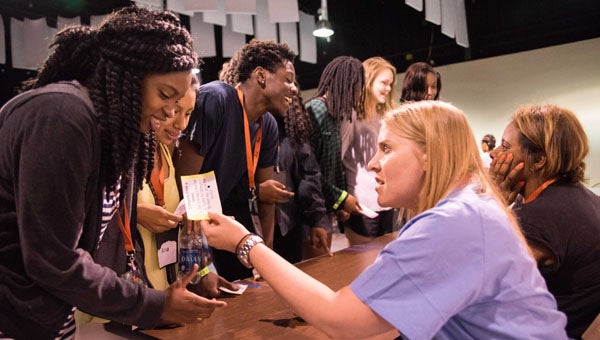Anytown Alabama: Students examine issues at social justice leadership camp
Published 5:01 pm Friday, June 10, 2016

Students take part in an Immigration Situations session June 9 at Anytown Alabama, a social justice leadership camp held June 6-11 at Camp Hargis in Chelsea. (Reporter Photo/Keith McCoy)
By EMILY SPARACINO / Staff Writer
CHELSEA – Anytown Alabama redefined the meaning of “camp” to more than 70 students who explored racism, sexism and other pressing social issues at the weeklong program this month.
“It definitely has already started to change my life even though it’s only the fourth day,” Chelsea High School sophomore Tyler Lundy, 15, said on the morning of June 8, just before a group session on racial and ethnic identity began. “I feel like everybody is becoming a better person.”
Representing nearly 30 high schools in the Birmingham area, Lundy and his fellow campers – also called delegates – gathered at Camp Hargis in Chelsea from June 6 to June 11 to participate in group activities and discussion aimed at helping them develop leadership skills, appreciate different cultures and learn how to appropriately respond to challenging situations in life.
“We really let them explore it and what it looks like to them,” Anytown Alabama co-director Rebecca Harkless said of each topic. “We give them tools to build a more inclusive community.”
Hosted by the YWCA Central Alabama, Anytown Alabama is an annual social justice leadership camp for high school students (mostly students entering 10th, 11th and 12th grades) that was started by the National Conference for Community and Justice in 1989 and is currently the product of a partnership with the YWCA Central Alabama.
Delegates are diverse in race, religion, sexual orientation, gender and neighborhood.
“I was overwhelmed with how amazing this program is and how empowering it is,” said Harkless, who is in her fourth year with the program and her second year as co-director.
During the racial and ethnic identity session, delegates reviewed the definitions of race (how others perceive a person based on physical characteristics) and ethnicity (shared ancestry, culture and language), and participated in an exercise designed to show the impact race and identity can have on people from all walks of life.
“It is changing my life,” 17-year-old CHHS senior Sarah Rabenau said of the program. “In school, you don’t have this type of education. This is very informative. It really opens your mind.”
Rabenau and Lundy spoke about a session titled “The Power of Gender Roles” the delegates completed June 7, both noting the emotional depth the discussion reached for many of the delegates.
“It really hit your heart just to realize this issue is real,” Rabenau said. “It was very emotional.”
Dimari Jordan, an 11th grader at Alabama School of Fine Arts, echoed Rabenau’s sentiments.
“It was just very eye-opening to know there are other people who have gone through the same thing,” Jordan said. “Even if you don’t learn from the lessons themselves, you learn from your peers.”
Anytown Alabama is designed to teach delegates to appreciate other cultures and beliefs as they celebrate theirs.
Other topics delegates examined at the camp were religious oppression, classism and immigration.
“I’m hoping to gain a better understanding and perspective and have a better respect for everyone and everything,” Lundy said.
Rabenau described the week as a “bonding experience” for the students.
“Now, I feel like we’re family,” she said. “I’m so happy to learn from everyone.”









